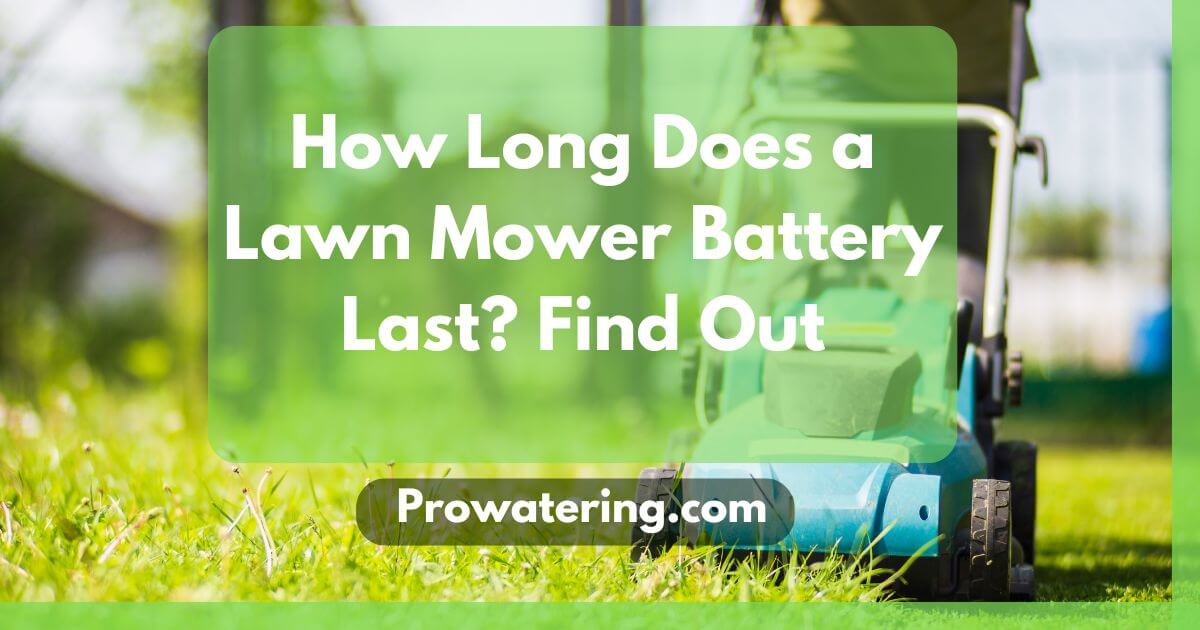A lawn mower battery’s lifespan varies based on type and usage. Lead-acid batteries generally last 3-4 years with proper maintenance. Lithium-ion batteries provide up to 5 years of service and are maintenance-free. High-end lithium iron phosphate batteries can extend up to 10 years.
Factors such as usage patterns, environmental conditions, and charging practices significantly affect longevity. Signs of battery replacement include difficulty starting, slow engine cranking, and low voltage readings. Proper maintenance, including regular charging and storage in cool, dry places, can extend battery life.

For further details on selecting and maintaining lawn mower batteries, explore additional insights.
Introduction to Lawn Mower Batteries
Lawn mower batteries, necessary for the reliable operation of electric and riding mowers, come primarily in two types: lead-acid and lithium-ion. Lead-acid batteries are the traditional choice, typically 12-volt, and require periodic maintenance practices such as checking fluid levels. These batteries generally last between 3-4 years with proper care. In contrast, lithium-ion batteries offer a more advanced solution, being lighter, maintenance-free, and capable of lasting 4-5 years or up to 500 charging cycles.
Several factors profoundly influence the lifespan of a lawn mower battery. The battery type plays a vital role; lithium-ion batteries usually exhibit less capacity degradation over time compared to lead-acid batteries. Usage frequency and charging cycles also affect longevity, with frequent use and improper charging habits accelerating wear.
Storage conditions, particularly during off-seasons, are crucial; both battery types should be stored in cool, dry environments to minimize temperature effects that can reduce lifespan. Environmental factors such as temperature extremes can further compromise battery performance. Proper maintenance practices, including regular charging and following manufacturer guidelines, are necessary for extending battery life.
Ultimately, a detailed understanding of these factors guarantees optimal performance and longevity for lawn mower batteries.
Types of Lawn Mower Batteries
Delving into the various types of lawn mower batteries reveals distinct differences in technology, maintenance requirements, and performance characteristics. Among the primary lawn mower battery types are lead-acid batteries, which include wet cell, AGM batteries (Absorbed Glass Mat), and gel cell batteries. These traditional batteries typically operate at 12 volts and offer a lower upfront cost. However, they demand consistent lawn mower battery upkeep and generally have a lifespan of 3-4 years.
In contrast, lithium-ion batteries are gaining popularity due to their lighter weight, extended lifespan of 4-5 years, and reduced maintenance needs. Available in 12-volt or higher configurations, such as 40V models, these batteries come at a higher initial cost but promise long-term efficiency.
Lithium iron phosphate (LiFePO4) batteries represent another advanced option. As a subtype of lithium-ion batteries, they boast an exceptional lifespan of up to 10 years or 5,000 cycles, are maintenance-free, and perform well in various climates, including cold weather. Despite their superior performance, the lawn mower battery price for LiFePO4 batteries remains the highest among the options.
When selecting a battery, it is vital to contemplate the lawn mower battery voltage requirements, physical size, terminal type, climate, and long-term cost efficiency.
Factors Affecting the Lifespan of a Lawn Mower Battery
Several important factors influence the lifespan of a lawn mower battery, including battery type and quality, usage patterns, environmental conditions, charging practices, and maintenance routines.
The battery type plays a notable role, with lead-acid batteries generally lasting 3-4 years and lithium-ion batteries extending up to 4-5 years or 500 charging cycles. Superior quality batteries, constructed from better materials, typically offer extended durability.
Usage patterns are also crucial, as frequent or strenuous lawn mower battery usage on large or rugged terrains can considerably shorten the battery lifespan.
Environmental conditions, including exposure to extreme temperatures, can negatively affect battery performance and longevity. High temperatures accelerate degradation, while cold conditions can temporarily impair efficiency.
Proper charging habits are essential for maximizing lawn mower battery performance. Overcharging or undercharging can damage battery cells, so adhering to the manufacturer’s voltage requirements and charging recommendations is important. Utilizing smart charging systems can optimize charging cycles.
Maintenance routines, such as regular cleaning of battery terminals and appropriate storage in cool, dry conditions, are important for prolonging lawn mower battery lifespan. Addressing any issues promptly can help maintain overall battery health and identify replacement indicators early.
How Long Does a Lawn Mower Battery Last?
The typical lifespan of a lawn mower battery ranges from 3 to 5 years, contingent upon proper maintenance and usage. This span can be influenced by various factors affecting lawn mower battery longevity, such as battery type, quality, and usage patterns.
Lead-acid batteries generally last between 3-4 years, whereas lithium-ion batteries can extend up to 5 years or 500 charging cycles, showcasing superior rechargeable lawn mower battery durability.
Effective battery management systems are pivotal in prolonging battery life. Regular charging, avoiding complete discharge, and storing the battery in a cool, dry place, especially during off-season periods, are essential practices. Employing a battery maintainer during storage can further extend lawn mower battery life.
Choosing from the best lawn mower battery brands can also impact longevity. High-quality batteries coupled with diligent maintenance practices can notably enhance battery durability for lawn mowers. The longevity of a lawn mower battery is also affected by environmental conditions, with temperature extremes noticeably reducing lifespan.
Signs Your Lawn Mower Battery Needs Replacement
A few critical indicators can signal when your lawn mower battery requires replacement. Difficulty starting the mower is a primary sign of declining lawn mower battery performance. If you hear a clicking sound or the engine cranks slowly, the battery may lack sufficient power. Additionally, a low voltage reading, notably below 12 volts, often indicates a failing battery.
Another clear sign is if the battery fails to hold a charge. Rapid drainage after charging or frequent need for jump starts suggests significant deterioration. Visible damage or corrosion on the battery casing or terminals also necessitates replacing the lawn mower battery. Cracks, bulges, or leaks can severely impact battery efficacy and safety.
The age of the battery is another factor affecting lawn mower battery lifespan. Given the average lifespan of a lawn mower battery is 3-5 years, older batteries are more likely to exhibit diminished performance. Weak or slow engine cranking further supports the need for replacement.
Diminished runtime and decreased mower power are additional signs. By understanding these indicators and following maintenance tips for lawn mower batteries, you can better gauge when replacing your lawn mower battery is essential to maintain optimal lawn mower battery care.
Tips for Extending the Lifespan of Your Lawn Mower Battery
Maximizing the lifespan of your lawn mower battery involves following best practices in charging, maintenance, storage, and usage.
To achieve the best lawn mower battery life, always charge the battery after each use and avoid allowing it to completely discharge. Utilize a smart charger to prevent overcharging and consider a trickle charger for off-season storage.
Regular maintenance is crucial for lawn mower battery longevity. Keep the battery clean and dry, routinely inspecting and cleaning terminals to prevent corrosion. For lead-acid batteries, ensure proper fluid levels are maintained.
Proper storage significantly impacts lawn mower battery duration. Remove the battery from the mower during winter and store it in a cool, dry place, fully charged. A battery maintainer can help keep it in optimal condition during extended storage periods.
Usage habits also play a vital role. Avoid frequent starts and stops, mow when the grass is dry, and keep mower blades sharp to reduce power demands. Additionally, protect the battery from extreme temperatures and moisture to prevent damage.
Best Lawn Mower Battery Brands to Consider
Choosing the appropriate battery brand is an essential step in guaranteeing longevity and performance for your lawn mower. Among the top contenders, EGO stands out with its high-quality 56V lithium-ion batteries, which are highly regarded for their durability and efficiency. Greenworks offers a variety of lithium-ion batteries, including 40V, 60V, and 80V options, suitable for both residential and commercial applications.
Ryobi is another popular choice, especially for homeowners, with its versatile 40V lithium-ion battery system. For those seeking professional-grade solutions, Milwaukee’s M18 FUEL line provides robust lithium-ion batteries designed for professional use. Toro and Craftsman cater to different needs by offering both lead-acid and lithium-ion batteries, making them suitable for various mower types.
Mighty Max is well-known for its dependable lead-acid and AGM batteries, commonly used in riding mowers. Husqvarna and WORX also provide high-quality battery options, with Husqvarna focusing on both lead-acid and lithium-ion models and WORX specializing in 20V and 40V lithium-ion batteries.
When choosing a battery, consider compatibility with your mower, battery type, voltage, capacity, and the intended use, whether residential or commercial. Warranty and customer support are also vital factors to guarantee long-term satisfaction.

I’m Carlos Robert, a passionate gardener, and blogger. With years of experience and knowledge in the field of garden watering, I have created a blog to share my insights and tips on the topic. I strive to provide readers with detailed information about all aspects of sprinkler systems, from garden sprinklers to fire sprinklers, along with nozzles, hoses, and other related products. I love helping my readers create the perfect garden with their ideal setup!

